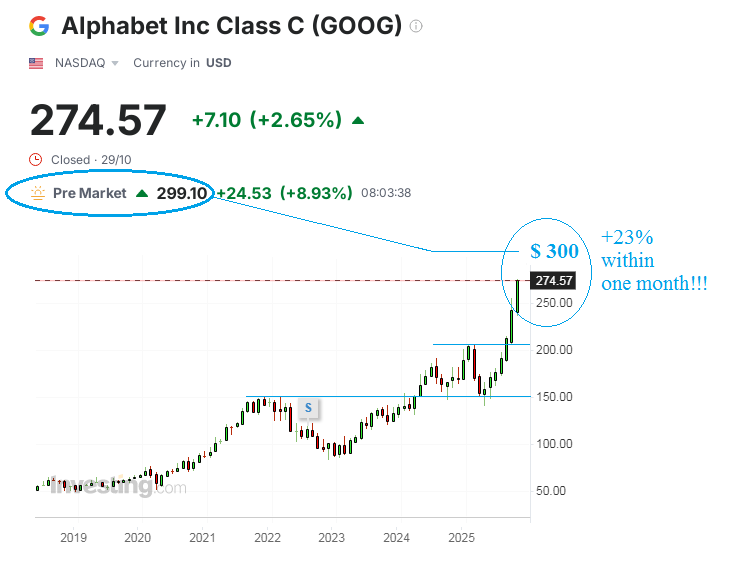Alphabet, Inc. - Class C (NASDAQ)
- By date
- Metadoro first
The success of Google earnings and the market's immediate response surprised even me, the most involved enthusiast of holding more Google shares in investment portfolio. Shares of Google-parent Alphabet (GOOG), which had already gained 14% since the beginning of the month on hot expectations, soared another 9% in extended trading hours on the night of October 30, nearly touching the $300 mark in pre-market trading. And they don't seem ready to slow down here for long. Perhaps a slight short-lived pullback could emerge, nothing above that.
The major reason behind this was that Google actually reported double-digit growth in every major business, beating preliminary expert estimates by far. Google's diluted EPS (earnings per share) was $2.87 vs much lower average forecast of $2.29, it's fantastic! The search engine-based plus cloud-related business together showed the first-ever quarter surpassing $100 billion in total sales. The so-called top-line number added 16% YoY to hit its record $102.35 billion vs average estimates of just $99.79 billion and against the giant's previous record achievement of $96.47 in Q4 2024. Purely search revenues rose 15% to $56.57 billion. The quarterly cloud-computing contribution surged 34% to $15.16 billion. Ad revenues from YouTube video platform gained 15% to $10.26 billion. Alphabet also said total ad sales are $74.18 billion in the quarter, up 13% YoY, with traffic acquisition costs rising modestly to $14.88 billion. Paid subscriptions, mostly consisting of cloud storage services and YouTube’s ad-free premiums, exceeded 300 million accounts. If these numbers are not enough for you, then the firm's capex (capital expenditures) increased to just under $24 billion during the period for ramping AI data centers and hardware. This will help to monetize AI technologies even better.
Despite headwinds like competitive steps by ChatGPT-maker OpenAI, which just launched its own browser, “our full stack approach to AI is delivering strong momentum... including the global rollout of AI Overviews and AI Mode in Search in record time,” said CEO Sundar Pichai. I have no words to add to these if I would like to justify why Google stock is in my personal top 5 picks to hold for the coming months.

Alphabet, Inc. - Class C (NASDAQ)
| Ticker | GOOG |
| Contract value | 100 shares |
| Maximum leverage | 1:5 |
| Date | Short Swap (%) | Long Swap (%) | No data |
|---|
| Minimum transaction volume | 0.01 lot |
| Maximum transaction volume | 100 lots |
| Hedging margin | 50% |
| USD Exposure | Max Leverage Applied | Floating Margin |
|---|









